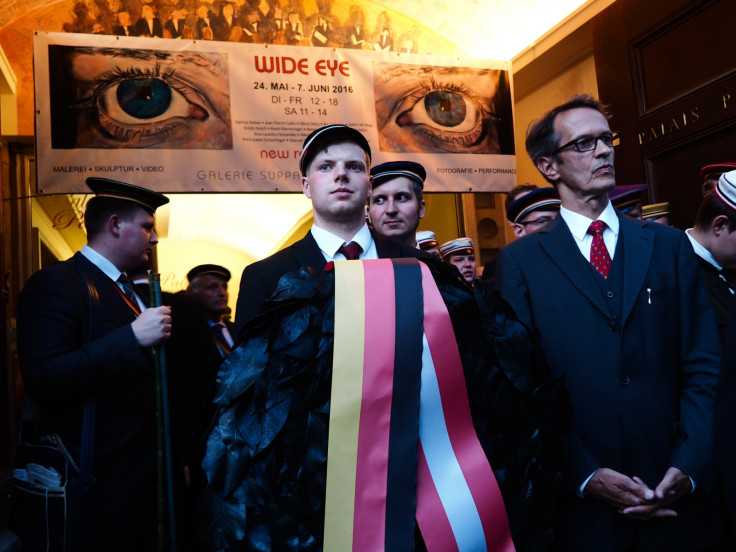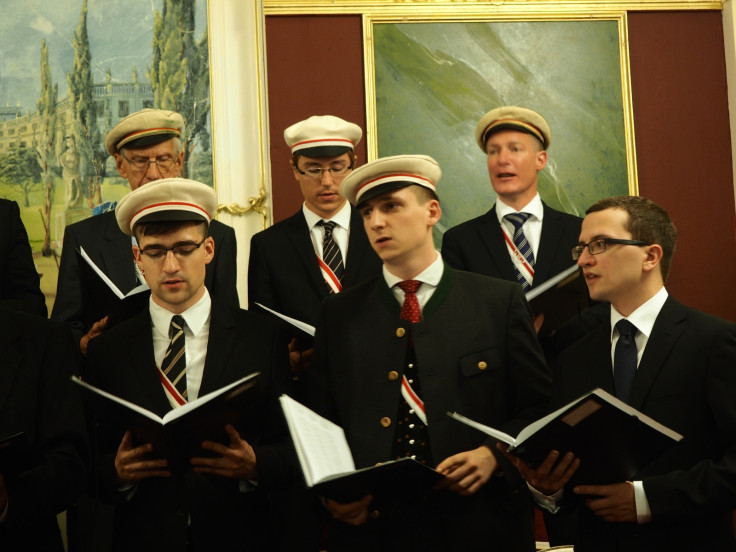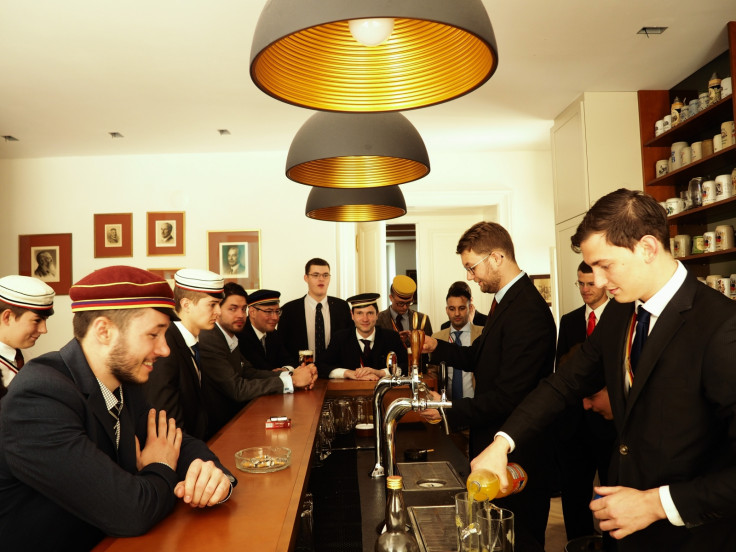'We're not Nazis' say Austria's sword-fighting frat-boys who dream of a Germanic Europe
B!B! movement piggy-backs on anti-Muslim sentiment but members are mocked and jeered at parades

On 8 June, some 50 individuals wearing old-fashioned suits with colourful sashes and bizarre flat caps, marched through the handsome streets of Vienna. At their head, a youth with straw blond hair gripped a ribbon with the colours of the German flag as his comrades chanted popular German songs and poems.
This is Austria and the crowd was made up from members of the Burschenschaften (B!B!), a coalition of German-nationalist student fraternities celebrating the Fest der Freiheit – or Feast of Freedom – when their movement played a leading role in 1848 revolution. But 168 years on, it is more modern issues that are pressing – namely, immigration.
"We don't have anything against immigrants but, if they want to stay here, they have to adapt and... How can I say? They have to give up their culture and adopt our own," said Klaus Kuchling from the Wien Akademische Turnverein student fraternity.
There are Burschenschaften groups all over Austria and 18 in the capital alone. Bernhard Weidinger, from the Documentation Archive of the Austrian Resistance (DOW) – a research institute focused on right-wing extremism – explained that while not all of these groups can be associated with the far-right, "the umbrella organisation, the Wiener Korporationsring (WKR), is dominated by extreme fraternities such as Olympia or Teutonia with long-standing relations with neo-Nazi and far-right extremists."
Leaders of the far-right Austrian Identitarian Movement (IBO), like Martin Sellner and Alexander Markovics, belong to their ranks – and the former was spotted by IBTimes UK during the anniversary party.
"For them freedom has nothing to do with individual freedom, it is not freedom from, but concerns rights and interests of the national German collective, it's freedom to, and means that everything is legitimate to serve and protect their German fatherland," said Weidinger.
After 1945 fraternity members were prominent within the far-right and the neo-Nazi scene.
In the 19<sup>th century, the B!B! was strongly anti-monarchist and fought for freedom of assembly in the face of royal surveillance and censorship. The movement has recently made attempts to rebrand itself in this legacy, but many argue that this is merely a way to draw attention from alleged affiliations with Nazism.
"During the Nazi period many fraternity members occupied high ranks. In the 1930s, the B!B! acted as a cover organisation for the National Socialist Party, which was outlawed in Austria until 1938. After 1945, fraternity members were prominent within the far-right and the neo-Nazi scene," said Weidinger.

Since its establishment, the Burschenschaften has gathered every Wednesday at the University of Vienna to celebrate its German heritage. On 8 June, protected by police, the group assembled to once again defend its "German-ness," much to the amusement and repugnance of other Austrian students who greeted members with jeers and insults.
"We are just express our right to be here as representatives of the superior German culture, and we try to grow our membership," said Kuchling.
Being in a Burschenschaften is not considered cool anymore due to a number of factors, including its out-dated look and manners. German nationalist fraternities now struggle to attract young students, with most recruits coming from families with historic ties with the groups.
Retreating before the sharp blade is considered a sign of cowardice, which could result in expulsion from the fraternity.
As the celebration drew to a close, the police escorted the fraternity members to the nearby WKR Bursa for drinks. In the past a Bursa was a communal house with a communal budget, where a fellowship of men lived, studied and prayed under the same roof. Burschenschaft literally means "the men belonging to a Bursa".
In the 1840s fraternities were split between nationalist Burschenschaften and religious corps. One of the defining characteristics of the Burschenschaften was the prominent role given to fencing or Mensur. "Mensur dates back to the Middle Age, when rich students went to school and, in order to protect themselves from the thugs who tried to rob them, they used the schlagend (sword)," said Demanega from Teutonia.
"We want to keep this tradition alive and maintain the same codes of honour."
Despite the fact that they refer to these armed duels as any average sport activity they practise, many fraternity members have scars on their head, cheeks or chest. Retreating before the sharp blade is considered a sign of cowardice, which could result in expulsion from the fraternity.

B!B! members share more than just a love of fencing, binge-drinking and chain-smoking with those in the Bursa: "We are all German and we don't care about European national borders," said Demanega, who belongs to a German minority living in South Tyrol in northern Italy. "We want to preserve our German language, traditions and culture, despite everything else."
"We are German nationalist and not Nazi. We fight to save our heritage," Kuchling said.
The B!B! believes in the organic unity of German-speaking peoples and is strongly devoted to pan-Germanic culture, but the need to protect this authenticity throughout the years has reached foreseeable extremes. "Some years ago some of the most extreme fraternities in Austria and Germany decided that biological descent should be a criterion for the admission of new members," Weidinger said.
Today 80% of the B!B! members are aligned with the Freedom Party of Austria (FPO) and 18 of 38 Freedomite MPs and 19 out of 35 federal party board members belong to fraternities," said Weidinger. The FPO's chairman, Heinz Christian Strache, is himself a member of Vandalia. Nina Horaczek, a local journalist famous for her controversial biography on Strache, said that Vandalia is, "the group that hosted members of Olympia members, when Olympia closed its doors following accusations of Nazism".

Strache's ties with the B!B! are both personal and political. When the FPO's leader Jorg Haider left the Party in 2005 to found Alliance for Austria's Future (BZO), the fraternities helped rebuild the party under Strache's leadership and, in exchange, they secured the FPO's commitment to "the community of the German people" (or Deutsche Volksgemeinschaft), evoking the Nazi credo, which believed that the German people formed a natural community, membership of which could only be secured through birth to German parentage.
If the fraternity influence has bolstered the German-nationalist and anti-Semitic traditions within the FPO, the emergence of anti-Muslim racism as the current central rallying point of the right has served to push this anti-Semitism into the shadows.
"The most important thing for us now is that Austrians come first in every field, from culture to education," said Marhus Kipfl, Olympia member and FPO's representative of the Student's Parliament. "We don't want migrants to come here and keep their own culture. We want them to return where they came from. Asylum is not a life-long right."
"I know it goes against my own self," said Demanega, "but I endorse border fences if that means stopping criminals from coming in."
On 2 October the Freedom Party will try once again to make its candidate, Norbert Hofer, the first far-right President in the European Union, after the Austrian constitutional court annulled the result of May's presidential election.
While much of the Austrian society may ridicule the B!B!, members have plenty of reason for the countless toasts "To Freedom" they shout, as their tomorrow appears ever closer. The historical position of Austria as a hub of exiles, of artists and intellects may soon float away on a sea of xenophobia and weissbeer.
Eleonora Vio is a freelance journalist based in the Middle East and co-founder of Nawart Press media platform and association.
© Copyright IBTimes 2024. All rights reserved.






